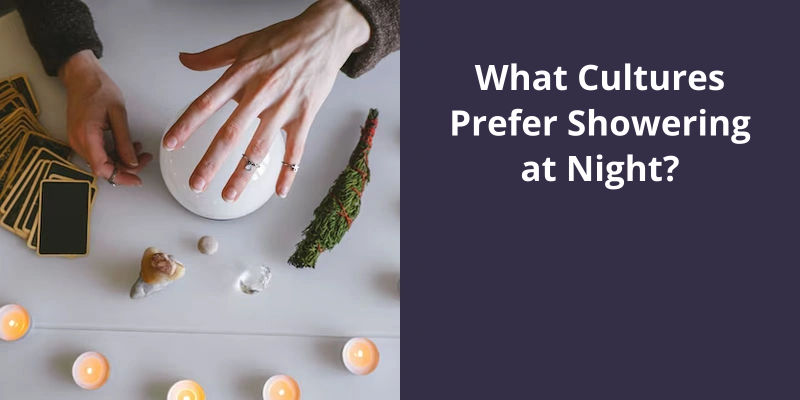Several cultures globally tend to prefer showering at night time. For instance, in Japan, the habit of bathing at night is not just a modern practice but a tradition that has been passed down through generations. It’s believed that a nightly bath helps rid of the toxins and dirt accumulated during the day, promoting relaxation. Similarly, in South Korea, individuals often prefer night showers as a way to unwind after long work hours. In contrast, western cultures like the United States and Canada traditionally favor morning showers to refresh and kick start their day. Over time, individual habits and personal hygiene preferences have blurred these cultural boundaries, with many people around the world now showering at night for practical reasons such as saving time in the morning or for their perceived health benefits.

Do Chinese Bathe at Night?
In Chinese culture, bathing at night is considered a fundamental part of daily hygiene. It’s believed to be a way to wash away the stresses of the day, refresh the body, and prepare it for a restful night’s sleep.
The home is seen as a sacred space, and it’s important to keep it clean and pure. Bathing at night is seen as a way to cleanse oneself before entering this sacred space. It’s also believed to cleanse the body of negative energy and promote positive energy, leading to better health and well-being.
On the other hand, the Western approach to bathing in the morning is more focused on preparing for the day ahead. The morning shower is seen as a way to energize and wake up the body, and to get ready for the challenges of the day ahead. It’s also seen as a way to start the day on a clean and fresh note, ready to face whatever comes your way.
While these cultural differences may seem minor, they can have a significant impact on daily routines and well-being. For example, the Chinese approach to bathing at night may help promote better sleep, leading to improved health and productivity.
While there may be cultural differences in bathing routines, both approaches can promote good hygiene, relaxation, and well-being.
How the Time of Day That One Takes a Shower/Bath Can Affect Different Aspects of Their Lives (Productivity, Relaxation, Etc.).
Taking a shower or bath at different times of the day can impact various aspects of one’s life such as productivity and relaxation. However, the specifics of how these factors are affected depends on individual preferences and biological rhythms.
Aside from the hygiene benefits, bathing before bed is also viewed as a way to relax and unwind after a long day. It’s a time for Japanese people to de-stress and mentally prepare for a good night’s sleep. Additionally, communal bathing in onsens (hot springs) is a popular pastime and social activity in Japan.
Why Do Japanese People Bath Before Bed?
In Japanese culture, bathing isn’t just a hygienic activity, but also a social and spiritual one. It’s considered a way to cleanse both the body and the mind. Many Japanese people see it as a way to relax and unwind before bed, allowing them to feel refreshed and ready for a good nights sleep. The ritual of bathing is also deeply ingrained in Japanese traditions – from the communal hot springs of onsen, to the private home baths known as ofuro.
One reason why Japanese people prefer to bathe before bed is related to their work culture. Many Japanese workers have long and stressful days, often working well into the evening. Taking a bath before bed is a way to signal to the body that work is over and it’s time to relax. This helps to reduce stress and promote mental and physical relaxation, which in turn makes it easier to fall asleep.
Another reason for this tradition is related to the Japanese concept of cleanliness. In Japan, cleanliness is highly valued, and there’s a strong cultural belief that it’s important to keep the home and oneself as clean as possible. Bathing before bed helps to remove any dirt or grime that may have accumulated on the body during the day, ensuring a fresh start for the following day.
This type of bath involves soaking in a deep, hot bath for an extended period of time. Ofuro baths are believed to have a number of health benefits, including improved circulation and relief from muscle pain and stress.
Beyond it’s practical benefits, it’s also seen as a way to promote relaxation, reduce stress, and cultivate a sense of cleanliness and purity.
With that being said, there still remains a sizeable number of individuals who choose to indulge in a nighttime rinse-off. So, what’s it that makes nighttime showers so appealing to some?
Why Do People Shower at Night Rather Than in the Morning?
However, there are a few reasons why people opt to shower at night rather than in the morning. For one, showering at night can aid in calming the body and mind, making it easier to fall asleep. The warm water can relax muscles, and the act of washing away the days grime can help one mentally unwind. It can also be a more convenient option for those with busy mornings or long commutes.
Some people find that showering before bed helps them feel cleaner, as they can wash away any sweat or grime that may have accumulated throughout the day. This can be particularly important for those who live in hot, humid climates or engage in physical activity that makes them sweaty. Additionally, showering at night can reduce the amount of oil and dirt that gets transferred to bed sheets, potentially leading to fewer breakouts and better skin health.
Perhaps they grew up in a household where nighttime showers were the norm, or they find that it helps them wind down after a long day. Some people also simply enjoy the feeling of climbing into bed feeling clean and refreshed, and showering at night helps them achieve that sensation.
For one, it can provide a necessary jolt of energy to kickstart the day. The act of washing away sleepiness and feeling the refreshing water can help one wake up and feel more alert. Additionally, for those who sweat a lot during the night, a morning shower can be a crucial step in starting the day feeling fresh and clean.
It ultimately comes down to personal preference and lifestyle. Whether you prefer to start your day with a burst of energy or wind down before bed, the important thing is to find a routine that works for you and helps you feel your best.
The Role of Cultural Background in Determining Showering Habits
The cultural background of an individual can influence their showering habits. This is because different cultures have varying attitudes towards cleanliness and personal hygiene. Therefore, showering frequency and technique may differ among people from different cultural backgrounds.
It’s interesting to note that while showering has become a common practice in China, there are still some traditional beliefs surrounding bathing. However, according to research, the frequency of showering in China is fairly consistent with other countries around the world.
How Often Do People in China Shower?
This study highlights the fact that personal hygiene is as important to the people of China as it’s in the Western world. Showering, like brushing their teeth or washing hands, is a daily routine that people in China follow without fail. It’s a tradition that’s passed down from generation to generation and is considered a crucial part of maintaining good health, cleanliness, and well-being.
In China, where the climate tends to be more humid and tropical, people tend to sweat a lot more. This can cause a buildup of bacteria on the skin, leading to various skin infections and diseases. Therefore, showering not only helps to keep the body clean but also helps prevent the spread of infections.
These include the individuals lifestyle, occupation, location, and personal preferences, among other things. People who work in physically demanding jobs or live in hot and humid regions tend to shower more frequently than others.
Those living in urban areas, where the pace of life is fast, tend to take quick showers as they’ve limited time. On the other hand, those in rural areas typically take longer showers and may not shower as often due to the lack of infrastructure and facilities.
While there’s no one-size-fits-all rule, the majority of people shower at least once a week, which is comparable to the Western world. Bathing is considered a crucial part of maintaining good health and well-being and is taken quite seriously by the people of China.
Comparison of Showering Habits Between Urban and Rural Areas in China
This study examines the differences in showering habits between urban and rural areas in China. It aims to compare the frequency, duration, and attitudes towards showering in these two settings. The results contribute to our understanding of how culture and environment impact personal hygiene practices in different regions.
Source: How often do people in different Southeast Asian countries …
Conclusion
The Chinese culture sees the home as a sacred space that must be kept clean, hence their preference for showering at night to wash away the impurities of the outside world. In contrast, the Western culture focuses on being active and energized in the morning to face the challenges of the day. These cultural differences may seem trivial, but they demonstrate the vast range of practices and beliefs around the world that shape our daily lives. It's important to acknowledge and respect cultural differences and understand that there isn’t one "right" way to do things.





